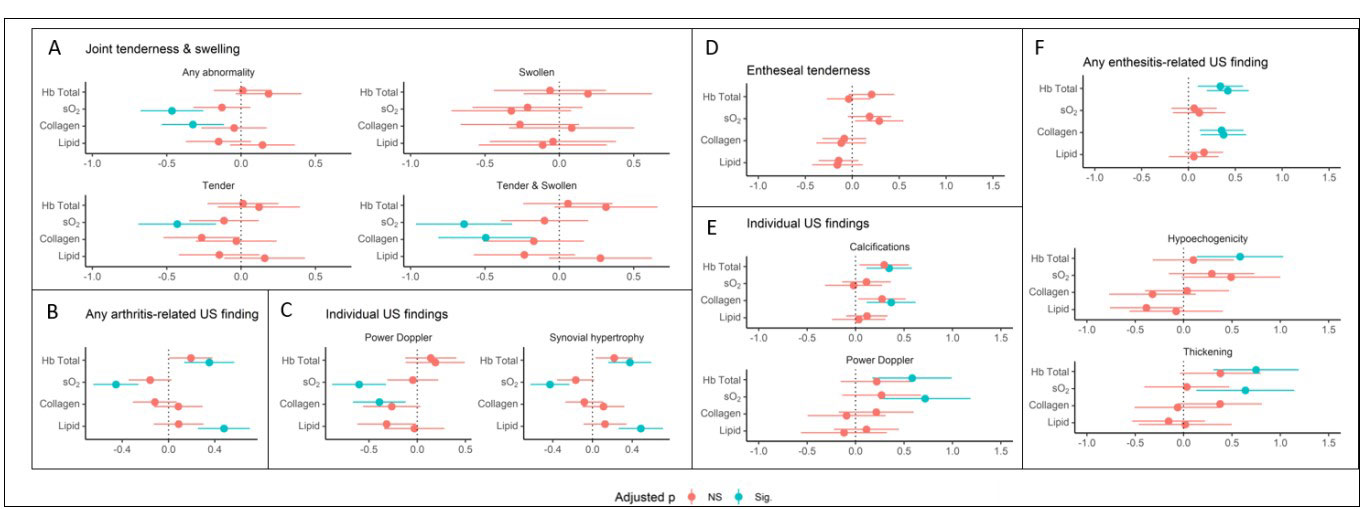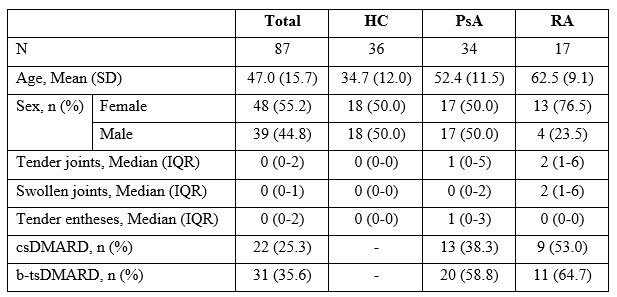Session Information
Session Type: Abstract Session
Session Time: 3:00PM-4:30PM
Background/Purpose: For individuals with inflammatory arthritis, a detailed metabolic characterization of joints and entheses at the tissue level can aid in early diagnosis and treatment decision (1). The metabolic characteristics of synovitis and enthesitis are, however, poorly understood at the moment. Multispectral optoacoustic tomography (MSOT), an innovative metabolic imaging technology, could be utilized to non-invasively perform metabolic profiling of joints and entheses by stimulating tissues with a near-infrared multispectral laser and detecting the emitted acoustic energy. This allows to quantify tissue components such as oxygenated and deoxygenated haemoglobin, collagen, and lipids in-vivo based on differential absorbance at multiple wavelengths (2, 3). The purpose of this study was to use MSOT to investigate the metabolic features of arthritis and enthesitis in a cohort of patients affected by inflammatory arthritis and healthy controls.
Methods: Healthy controls (HC) and patients with rheumatoid arthritis (RA) and psoriatic arthritis (PsA) participated in this cross-sectional study (Table 1). The metacarpophalangeal joints, wrists, entheses of lateral epicondyles, patellar, quadriceps, and Achilles tendons were all examined clinically, as well as by ultrasound (US) and MSOT. Haemoglobin, oxygen saturation, collagen, and lipid levels were all assessed using MSOT. Using linear mixed effects models, we estimated scaled mean differences (SMD) between inflamed and uninflamed joints and entheses as identified by clinical examination or US.
Results: We collected 1535 MSOT and 982 US scans from 87 subjects (36 HC, 34 PsA, 17 RA). Entheseal tenderness was not related to metabolic alterations, while US enthesitis was linked to higher collagen content, total haemoglobin and oxygen saturation. Clinical and US arthritis, on the other hand, displayed higher haemoglobin levels but lower oxygen saturation and collagen content. Increased lipid concentration in the joints was related to synovial hypertrophy (Figure 1).
Conclusion: MSOT is a non-invasive method for identifying metabolic alterations in arthritis and enthesitis. In synovitis, these results indicate enhanced synovial cellularity, collagen breakdown, and metabolic demand; whereas in enthesitis, they reflect greater tissue apposition and vascularization. Our findings suggest that synovitis and enthesitis are not only clinically and anatomically-functionally distinct, but also demonstrate markedly different metabolic patterns.
Scaled differences and 95% confidence intervals of MSOT-determined metabolite values by clinical and ultrasonographic findings of and arthritis (A-C) and enthesitis (D-F). Two differences are plotted for each metabolite indicating two multispectral processing algorithms used for estimation. P values were adjusted for multiple testing using a false discovery rate of 5%. NS, not significant. sO2, oxygen saturation.
HC: healthy controls, PsA: psoriatic arthritis; RA: rheumatoid arthritis; SD: standard deviation; IQR: interquartile range; csDMARD: conventional synthetic disease-modifying antirheumatic drugs; b-tsDMARD: biologic and targeted synthetic DMARD.
To cite this abstract in AMA style:
Tascilar K, Fagni F, Kleyer A, Bayat S, Heidemann R, Steiger F, Kroenke G, Bohr D, Ramming A, Yalcin Mutlu M, Minopoulou I, Hartmann F, Klett D, Federle A, Regensburger A, Wagner A, Knieling F, Neurath M, Schett G, Waldner M, Simon D. Non-Invasive in Vivo Metabolic Profiling of Inflammation in Joints and Entheses by Optoacoustic Imaging [abstract]. Arthritis Rheumatol. 2022; 74 (suppl 9). https://acrabstracts.org/abstract/non-invasive-in-vivo-metabolic-profiling-of-inflammation-in-joints-and-entheses-by-optoacoustic-imaging/. Accessed .« Back to ACR Convergence 2022
ACR Meeting Abstracts - https://acrabstracts.org/abstract/non-invasive-in-vivo-metabolic-profiling-of-inflammation-in-joints-and-entheses-by-optoacoustic-imaging/


